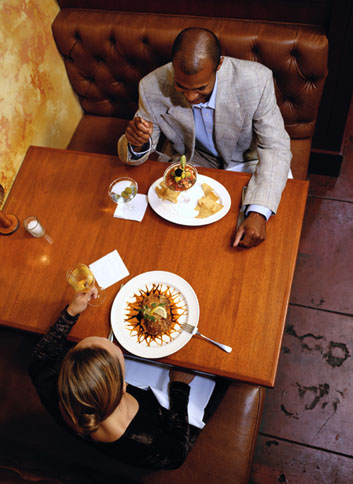A few years ago, I was hosting a “How to Beg” session on a weeknight before the telethon. One of the attendees, no longer with the station, said the following statement:
 “We need more premiums at lower donation levels. Our listeners can’t afford to give thirty-five dollars.”
“We need more premiums at lower donation levels. Our listeners can’t afford to give thirty-five dollars.”
(At the time, we were offering CD’s at the $35 level.)
I said:
“How do you know your listeners can’t afford to give that much?”
She responded:
“Well, I just know. We don’t reach people who have a lot of money to spend on WRUW. For example, students don’t have much money. Sure, there are some wealthy people who can give that much, but our average listener can’t afford to.”
To which I responded:
“How do you know for sure?”
To which she adamantly responded:
“Well, I just know.”
And I thought (but didn’t say):
“You don’t know ‘diddly-squat’ about your listeners.“
It’s true, isn’t it? We don’t do Arbitron ratings. We don’t survey our audience. We don’t know anything about our listeners – who they are, how old they are, what types of incomes they make, or where they live. We just don’t know.
So why do we assume they “can’t afford to give”? It just doesn’t make sense.
This programmer is not the only one who has ever said it. Every year, programmers say such statements on-air during the fundraiser. Statements such as “I know $40 is a stretch for most of you” or “I know we’re asking for a lot of money …”
The fact is … you don’t know “diddly-squat” about your listeners income and expenditures. You have no idea what your listeners can afford to give, and you would be surprised at what people are WILLING to give … whether they can afford to or not.
Those Who Want to Give, Do
When Annie Weatherhead did the blues on Monday nights, she told a story of a female caller who donated didn’t want her name read on the air. The caller was donating some of the money her husband gave her as an ‘allowance’ for food and supplies and she didn’t want her husband to know about the donation to WRUW.
This caller was WILLING to give money that she didn’t really have.
On the other hand …
I used to work with a guy named Derek who sold our company’s computer training services. Derek was in his early 30’s, and had a “clean-cut Fortune 500 corporate-business-guy” image with an appropriate salary.
Derek and I were talking about music one day, and I was surprised to learn he was a confirmed “metal head”. He often went to metal shows, bought metal music and listened to the metal shows on all the college stations. He definitely COULD AFFORD to give money to college radio, but confessed he never had.
And …
Just before the 2003 telethon, I met one of the top managers at The Plain Dealer. He recognized my name and voice, and he asked “Do you do a radio show on WRUW?”
He said his wife listens to my show on Sundays, and they often listen to a lot of college radio. In 2004, this top manager gave $35 to the WRUW telethon. In 2005, he gave $35 again. He didn’t give anything in 2006. He definitely COULD AFFORD to give money, gave some, and may have been able to give more.
Listeners Have Money, Even in “Tough Times”
Just about everyone has some amount of disposable income … that is, money that they use for “non-essential” purposes.
Oftentimes, disposable income is spent for emotional reasons such as to “feel good”, to “look good”, or to “live as good as or better than someone else”.
Then, the expenditure is justified with logic such as “I deserve it”, “it was on sale”, “it fit my décor”, or “I was here and tired of shopping around.”
 You have listeners who willingly shell out $3.00 for a cup of coffee their local coffee shop. Some of your listeners do this at least five days a week. ($15/week)
You have listeners who willingly shell out $3.00 for a cup of coffee their local coffee shop. Some of your listeners do this at least five days a week. ($15/week)
 You have listeners who pay to see live shows at places like the Agora or Beachland Ballroom. They pay an average ticket price of $10 to $17 plus probably buy at least one drink. Some of your listeners do this two or three times a month. ($25+ each month)
You have listeners who pay to see live shows at places like the Agora or Beachland Ballroom. They pay an average ticket price of $10 to $17 plus probably buy at least one drink. Some of your listeners do this two or three times a month. ($25+ each month)
You have listeners who work in offices downtown who easily spend $6.00 to $8.00 a day on lunch, rather than “brown bagging” it. ($30-$40/wk)
You have listeners who pay $50.00 per month for basic cable, over $100 with premium channels, and more for cable internet access.
You have listeners who regularly pay $25 to $40 for a carton of cigarettes, depending on the brand. If they smoke a pack a day, they buy a new carton every 10 days. ($75+ per month)
 You have listeners who dine out once every two weeks rather than cook for themselves and spend at least $50 for a meal for two people (two entrées at $9.95 each, plus drinks, appetizer, dessert, and tip).
You have listeners who dine out once every two weeks rather than cook for themselves and spend at least $50 for a meal for two people (two entrées at $9.95 each, plus drinks, appetizer, dessert, and tip).
You have listeners who pay $40 to $100 per month for cell phone service.
Your listeners go to amusement parks … they go to concerts and movies … they purchase books and magazines, buy CD’s and rent videos and DVD’s. They buy beer and cigarettes.
Your listeners have money to spend even in these so called “tough times.” They spend money just like you do.
You just have to give your listeners solid reasons why they should direct some of their money to WRUW at this time of year.
Take the Right Approach
Now, just because they have money to give does not mean you should turn on the mic and say “I know you have money to give, so why the hell aren’t you calling???!!!”
Wrong approach.
What you can do is be confident and assured that your listeners have money, and that they will give … at some point … if you give them enough emotionally convincing reasons to do so.
You can confidently say “When you give at the $40 level …”, or “When you give at the $50 level …” or “When you give at the $75 level…”
Help your listeners understand …
… their money is well spent on the things they like about WRUW – music and sound quality.
… we are all volunteer, so nothing goes into our pockets. All the money goes into buying music for them to hear, and the equipment to make it sound great. The more specific you can be about noticeable improvements, the better.
… a donation put on a credit card helps us right away, and the listener can pay it off as he or she sees fit.
… a donation of $40 … or $50 … or $75 … or $100 … does seem like a lot all at once, but when spread out over a year, it’s really not that much on a monthly or weekly basis.
In fact, a donation to WRUW is comparable to a lot of the other “fun money” expenditures they make in their lives.
Remember the “Stairway to Given”
The Corporation for Public Broadcasting, in one of many studies, measured the effectiveness of public radio fundraising.
The researchers found that the ability to afford a gift is the last step a listener must take before giving money. The first four steps all relate to a listener considering the programming important and worth supporting.
So, I’ll repeat …
When you give your listeners enough reasons that they can appreciate, they will be more likely to give to your show … at whatever price level you recommend to them.
Have fun getting ready for the telethon!
FACTOID: In 2016, 305 people gave $100 or more each during the fundraiser, and over 53 people gave $200 or more. 745 listeners had money to give in 2016, and we raised over $60,000.

